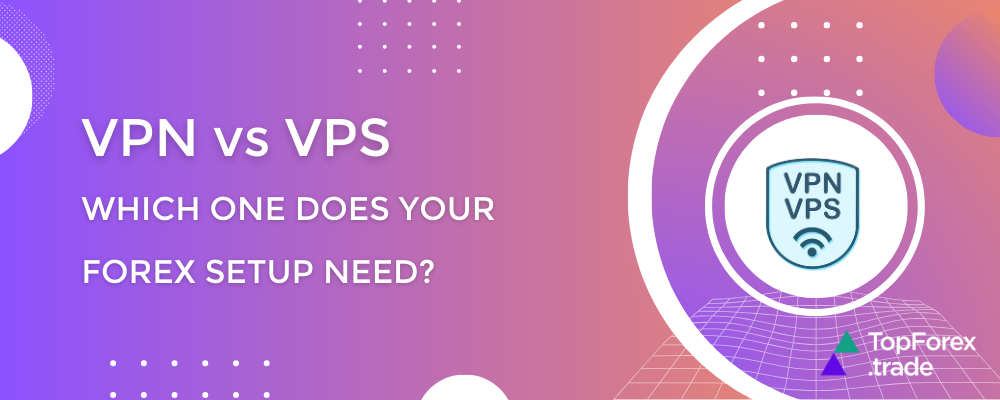VPN or VPS for Forex trading: key differences you need to know

In the competitive world of Forex trading, having the right technology can make all the difference. Many traders face a key choice: should they use a VPN (Virtual Private Network) or a VPS (Virtual Private Server) for their setup? Each offers unique benefits but serves different purposes that can affect your trading speed, security, and reliability. This guide breaks down what VPNs and VPSs do and how they apply to Forex trading. It also helps you determine which option—or possibly both—will best support your trading goals.
How to choose between a VPN and VPS for your Forex trading
VPN (Virtual Private Network) for Forex trading
What a VPN is:
A VPN (Virtual Private Network) creates a secure and encrypted connection over the internet, rerouting your connection through a remote server and masking your actual IP address. This is especially useful in Forex trading for enhancing security, privacy, and accessibility.
Why a VPN is needed in Forex trading:
- Enhanced security for sensitive data: Forex trading platforms require personal and financial information for account access and trade execution. By encrypting your connection, a VPN ensures that sensitive data like account credentials, banking details, and trade information are protected from hackers, especially if you’re on a public or shared network.
- Anonymity and privacy: A VPN hides your real IP address and location, making it harder for anyone to track your activities online. This privacy is crucial if you frequently log into trading platforms from various locations, reducing the risk of IP-based tracking or potential blocking from brokers who may flag unusual activity.
- Unrestricted access to trading platforms: In some regions, specific Forex platforms or broker websites may be restricted due to local regulations. By allowing you to connect to a server in a region where the broker is accessible, a VPN helps bypass these geo-restrictions. This flexibility lets you access your trading accounts seamlessly, regardless of location.
→Read more: Forex trading with VPNs: accessing restricted regions.
- Secured trading on public Wi-Fi networks: If you need to trade or monitor the markets from locations like coffee shops, airports, or hotels, a VPN provides an extra layer of security. These networks are often insecure, but with a VPN’s encryption, your trading data remains safe, allowing you to trade without exposing personal information.
- Protection against DDoS attacks: High-volume traders or those using larger accounts are sometimes targeted by Distributed Denial of Service (DDoS) attacks, which can disrupt trading activities. A VPN helps mitigate this risk by concealing your IP address, making it harder for attackers to locate your device and execute a DDoS attack on your connection.
VPS (Virtual Private Server) for Forex trading
What a VPS is:
A VPS (Virtual Private Server) is a dedicated virtual environment hosted on a physical server. This server runs continuously, providing a stable and reliable environment for Forex trading platforms. In Forex, a VPS is especially beneficial for traders using automated systems and for those who need low latency and reliable uptime.
→Check out: Forex trading with VPN and VPS: free offers of Top Forex brokers.
Why a VPS is needed in Forex trading:
- Consistent 24/7 uptime for automated trading: Many Forex traders rely on automated trading systems, such as Expert Advisors (EAs) or bots, which require constant uptime to execute trades as market conditions change. A VPS keeps your trading platform running even if your personal computer is off, ensuring that trades are executed without interruption around the clock.
- Low latency and faster trade execution: Forex is highly sensitive to timing, and even a slight delay in trade execution can impact profitability. VPS providers often host servers near financial centers, allowing for low latency connections to broker servers. This proximity enables faster trade execution, reducing slippage and improving outcomes for high-frequency and short-term traders.
- Stable connection independent of local network issues: A VPS operates independently of your local internet connection. If your home internet or power goes out, your trading platform remains unaffected. This reliability is essential for traders who cannot afford downtime, as trades continue running without interruption on the VPS, reducing the risk of missed opportunities or unintended losses.
- Ideal environment for backtesting and strategy optimization: Many traders use VPSs to run multiple instances of their trading platform for backtesting strategies or optimizing bots. The server’s dedicated resources ensure that backtests run smoothly without slowing down other processes on your personal device, enhancing productivity and allowing you to test strategies in real-time without system lag.
- Protection against local security threats: With a VPS, your trading platform is hosted on a secure server managed by professionals who implement firewalls, backups, and other security measures. This setup can reduce exposure to viruses or malware that may affect personal computers, safeguarding your trading activities in a professionally managed environment.
VPN and VPS for Forex trading: summary
- VPN: Use for secure, encrypted access to your trading platforms, particularly when connecting from different locations or public networks. It ensures privacy and provides a way to bypass regional restrictions, making it an essential tool for secure, flexible Forex access.
- VPS: Essential for reliability and performance, a VPS keeps your trading platform running 24/7, ideal for automated trading and low-latency trade execution. It also provides protection from local connection issues and allows for smoother backtesting and strategy optimization.
Many Forex traders benefit from using both technologies: a VPN for secure remote access and a VPS for reliable, high-performance trading. By combining a VPN’s security with a VPS’s stability, you can build a robust Forex setup that supports both privacy and uninterrupted trading.
The best VPNs and FX brokers with VPS
Now that you know the benefits of VPNs and VPSs for Forex trading, it’s time to choose the best options for your setup. Here’s a list of top VPN services and Forex brokers offering VPS hosting to help you boost security, performance, and reliability.
NordVPN for Forex trading
NordVPN is an excellent choice for Forex traders due to its strong security features, extensive server network, and competitive pricing. With over 5,000 servers in 60+ countries, it ensures fast, reliable connections and the ability to bypass geo-restrictions. NordVPN uses AES-256 encryption and supports secure protocols like OpenVPN and IKEv2/IPSec, making it ideal for safeguarding sensitive trading data. Its user-friendly apps for Windows, macOS, iOS, and Android ensure easy setup, while its affordable plans offer great value without compromising performance.
Surfshark VPN for Forex trading
Surfshark VPN is a great choice for Forex traders looking for an affordable yet feature-packed VPN. It offers flexible pricing with plans ranging from 1 to 24 months, including key features like CleanWeb ad blocking, MultiHop dual server for added privacy, and KillSwitch for security. Surfshark also allows easy access to geo-restricted content with its Bypasser feature. With savings of up to 82% on longer plans, it provides excellent value while maintaining strong performance and security for your Forex trading needs.
Proton VPN for Forex trading
Proton VPN is an excellent choice for Forex traders who prioritize privacy and security. Developed by the team behind ProtonMail, it operates under Switzerland’s strict privacy laws, ensuring your online activities remain secure. With AES-256 encryption and support for OpenVPN and IKEv2/IPSec, Proton VPN offers robust protection for your data. Its fast, reliable connections and global server network make it ideal for uninterrupted trading. Proton VPN offers a free plan with limitations, while its paid plans are affordable and provide access to more servers and features.
XM Group VPS service
XM Group is a leading trading service provider offering a wide range of instruments, including CFDs on oil, gas, stocks, gold, and more. Traders can choose from various account types, such as Micro, Standard, XM Ultra Low, and Shares, with a demo account featuring a $100,000 virtual balance for practice.
XM supports popular trading platforms like MT4, MT5, and WebTrader, all available on iOS and Android. Regulated by ASIC, CySEC, IFSC, and DFSA, XM also offers a 100% deposit bonus.
For enhanced performance, XM provides a VPS service with access to a Windows Server 2022, 2.5 GB RAM, 30 GB storage, and 1vCPU, ensuring stable connectivity for uninterrupted trading.
HF Markets VPS service
HF Markets (formerly HotForex) offers low spreads for trading UK and US Crude Oil and gold against USD and EUR. Traders can choose from various account types with no commissions and a low deposit.
The broker supports MT4 and MT5 platforms on desktop and mobile, plus a VPS service for stable connections. HFcopy allows traders to follow successful strategies.
Regulated by CySEC, FCA, FSCA, DIFC, and SFSA, HF Markets offers global services with a free demo account. HFM VPS plans are free with certain deposit/trading requirements or from $25/month.
BlackBull VPS service
BlackBull Markets is a respected forex and CFD broker, offering advanced MT4 and MT5 platforms with a wide range of analytical tools for effective strategy development. The broker focuses on user experience, providing excellent customer support and educational resources, making it suitable for both beginners and experienced traders. BlackBull Markets ensures security and transparency, offering a reliable environment for traders to enhance their skills in the dynamic forex market.
Additionally, BlackBull Markets offers free VPS services to clients with a minimum deposit of $2,000.
Related articles:
VPN vs VPS in Forex trading - FAQ
